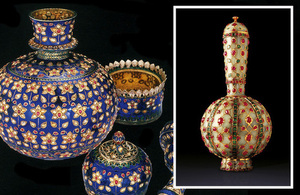Clive of India’s huqqa set and flask at risk of leaving the UK
Culture Minister steps in to prevent rare Mughal treasures from export

Clive of India's flask and hugga
Culture Minister Matt Hancock has placed a temporary export bar on Clive of India’s huqqa set and flask to provide an opportunity to keep them in the country.
The Mughal ruby and emerald flask and the sapphire and ruby huqqa set are both at risk of being exported from the UK unless a buyer can be found to match the asking price of £6,000,000 for the flask or £240,000 for the huqqa set.
It is believed that Robert Clive, also known as Clive of India, was presented with the flask as a gift following the Battle of Plassey. Clive was governor and commander-in-chief of India and became famous for his victory over the Nawab of Bengal during the battle in 1757. The flask itself is incredibly rare and there is no other object like it anywhere in the world, let alone in Britain. It has a silver interior and a gold exterior decorated in jade, emeralds and rubies.
Clive of India also brought the huqqa set back to the UK from India. Set with white sapphires and rubies, it was part of an original collection at the imperial court in Delhi. The huqqa set is considered to be an extremely rare survival as such lavish courtly objects were often broken down for their component parts. It isn’t known how Clive of India acquired the set, but smoking was widespread in India at the time and had become popular amongst the British living there as well. In fact, the British often had themselves portrayed in paintings reclining against brocade-covered bolsters on a terrace, peacefully smoking.
Minister of State for Digital and Culture Matt Hancock said:
These treasures are not only exquisite, they provide us with a glimpse into the fascinating lifestyle and traditions of the Mughal Court and the British presence in India at the time. I hope that we are able to keep these unique artefacts in the country to learn more about this extraordinary history.
The decision to defer the export licence follows a recommendation by the Reviewing Committee on the Export of Works of Art and Objects of Cultural Interest (RCEWA), administered by The Arts Council.
The RCEWA made its recommendation on the flask on the grounds of its close connection with our history and national life, its aesthetic importance and its outstanding significance for the study of Mughal political and technical history, the consumption of wine and gift-giving in Mughal India, Clive of India and the British expansion in India.
The RCEWA made its recommendation on the huqqa set on the grounds of its close connection with our history and national life and on the grounds of its outstanding significance for the study of Mughal court arts, gold and silver-smithing, jewel-setting, enamelling, and the place of tobacco in the social etiquette of early modern India and its adoption by British administrators in the later 18th century.
Sir Hayden Phillips, Chairman of the RCEWA said:
Apart from the intrinsic quality of these objects, and their outstanding importance for scholarship, the Reviewing Committee was unanimous in its recognition of their emblematic significance for our history and national life. Robert Clive was an outstanding and, indeed, controversial figure, but absolutely central to the creation of British rule in India. His statue, gazing out towards St James’s Park, stands guard at Clive Steps as they lead to the Foreign Office and The Treasury; a tellingly symbolic location for what he contributed to our history.
The decision on the export licence application for the flask will be deferred until 17 May 2017. This may be extended until 17 November 2017 if a serious intention to raise funds to purchase it is made at the recommended price of £6,000,000 (plus VAT of £1,200,000).
The decision on the export licence application for the huqqa set will be deferred until 17 April 2017. This may be extended until 17 July 2017 if a serious intention to raise funds to purchase it is made at the recommended price of £240,000 (plus VAT of £48,000).
Organisations or individuals interested in purchasing the flask or huqqa set should contact the RCEWA on 0845 300 6200.
ENDS
For media information contact:
Yasmin Kaye Campaigns Officer Department for Culture Media and Sport Tel: 0207 211 6489 Email: yasmin.kaye@culture.gov.uk
Images of the flask and hugga can be downloaded from Flickr.
Notes to editors
-
Organisations or individuals interested in purchasing the huqqa set or flask should contact the RCEWA on 0845 300 6200.
-
Details of the huqqa set are as follows: A silver huqqa set made up of five separate parts – 1) globular base, ht. 16.90 cm; 2) tobacco bowl, ht. 9.00 cm and 3) its cover, ht. 7.00cm; 4) ring, ht. 5.00 cm; 5) mouthpiece, ht.6.50 cm. North India, circa 1750
-
Details of the flask are as follows: Wine flask made of jade, lined with silver and set with rubies and emeralds; Height 25.30cm, width 11.20cm. India, 17th Century
-
Details of provenance: Robert, Lord Clive of Plassey (1725-1774) To his first son Edward Clive, 2nd Baron Clive of Plassey and 1st Earl of Powis (3rd creation 1804), (1754-1839). By descent to George Charles Herbert, 4th Earl of Powis (1862-1952). Then by descent sold at Christie’s, London 27 April 2004
-
The Reviewing Committee on the Export of Works of Art and Objects of Cultural Interest is an independent body, serviced by The Arts Council, which advises the Secretary of State for Culture, Media and Sport on whether a cultural object, intended for export, is of national importance under specified criteria.
-
The Arts Council champions, develops and invests in artistic and cultural experiences that enrich people’s lives. It supports a range of activities across the arts, museums and libraries – from theatre to digital art, reading to dance, music to literature, and crafts to collections. www.artscouncil.org.uk.